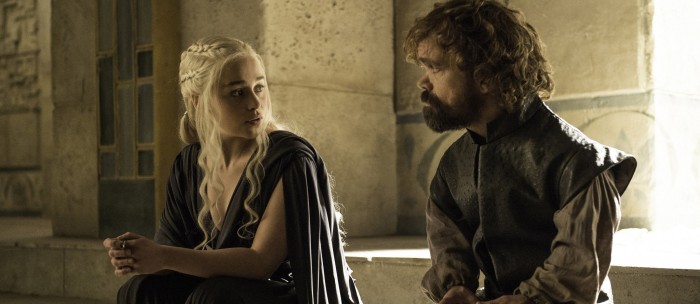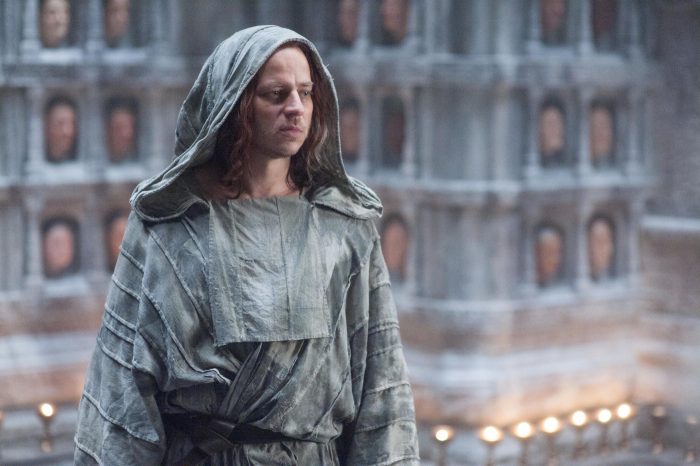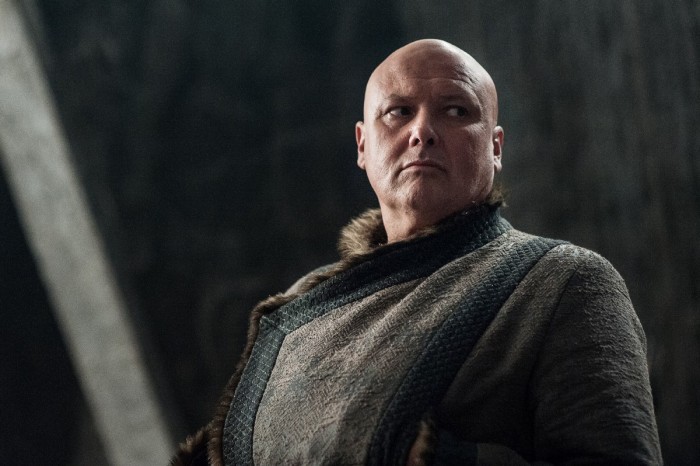
It’s been two weeks since Game of Thrones aired its series finale, not nearly enough time for even the most hardcore fans to go back and revisit the whole series to see how well it squares with the ending we got. Since a recent foot injury left me less mobile than usual, I, for one, found myself in the grips of an unquenchable need to process this pop culture event, while being physically unable to just “walk it off” like a normal person would. I had all this extra binge-watching time, a deeply renewed interest in the world of Westeros, and yet no new episodes (or, let’s face it, novels) on the immediate horizon.
So of course, I did the only rational thing and promptly started revisiting old episodes, binge-rewatching Game of Thrones until I literally made myself queasy with entertainment consumption. Someone needs to invent a term for that sort of sickness. The binge-watch bends?
As unhealthy as it was, I came out the other side of my marathon viewing with a greater appreciation for the full trajectory of the show’s characters. One of the narratives that has built up as part of the backlash against Game of Thrones is that it started betraying its characters toward the end, sacrificing logic and good character-based storytelling in favor of planned endings. When you’ve been watching the show from week to week over a span of eight years, it’s easy to forget some of the smaller moments as your memory clings to its impression of the characters over time. The question is, who were they, really, and did the show do an effective enough job of communicating that?

The Many-Faced God(s)
My biggest takeaway from the rewatch was that Game of Thrones is a show about people at war with each other … and at war within their own split selves. The main religion of Westeros is the Faith of the Seven, whereby George R.R. Martin reworked the Trinity of the Catholic Church as “one god with seven aspects.” Apart from that, there’s also the syncretic cult of the Faceless Men, which worships Death as a Many-Faced God.
Westeros is a world of many-faced individuals, characters who frequently display contradictory qualities. As a show-watcher, I realized I was so focused on one quality with certain characters that I perhaps recognized that as their defining trait, to the exclusion of other visible traits. It’s not always easy to keep track of every little thing when you have a series that’s as dense and diffuse as this juggling subplots.
Let’s get the big one out of the way first. Let’s talk about Daenerys. The day after the series finale, “The Iron Throne,” aired, I wrote at length about Dany’s arc and the broader cultural implications of it. Having gained some more distance from her city-destroying turn in “The Bells” and having rewatched the series in the interim, I can only say that for me as a repeat viewer, Dany’s ending absolutely squared with her story as threaded throughout the series.
During the rewatch, I found myself focusing a lot on Emilia Clarke’s line readings: the contents of her dialogue but also how she was saying it. Originally, I thought, well, maybe Clarke was playing one character and the showrunners had a different one in mind. Since she didn’t have foreknowledge of the show’s ending, that may be true to an extent, but there are definitely times onscreen when you can see Daenerys almost flip a switch in her eyes, softening or hardening her gaze as her inner dragon dictates.
A blank, pitiless look passes over face after she watches Khal Drogo pour the titular “golden crown” over her abusive brother’s head in Season 1, Episode 6. We would see variations on that look pop up many times in the series. Sometimes Dany’s eyes would come alive with “fire and blood,” the very motto of House Targaryen, which she promised to rain down on her foes. As far back as Season 2, when she was outside Qarth, she threatened to “lay waste to armies and burn cities to the ground” after her dragons were grown. So why didn’t many viewers, myself included, take those threats more seriously?
The empty bravado of war speeches — and dialogue in general — doesn’t necessarily equal good characterization, even on a show like Game of Thrones, which began its life as dialogue-heavy (only to become less so in later seasons, as this graph shows). With Daenerys, however, as the show became increasingly more action- and visual-oriented, we also saw her putting words to action, sometimes to horrific effect. It was all well and good when she was in far-flung Meereen, crucifying nobles; but when she arrived in Westeros and her self-assured power quest started negatively impacting characters we care about like Sam and Varys, that’s when we saw her brushing up against some much-needed character foils.

Lord Varys, Death by Dragon
Varys’ main shtick throughout the series was talking about the good of “the realm.” He was one of my favorite characters because he was one of the few who seemed to take a sober-headed macro view of Westeros. Yet he was also fundamentally two-faced, in a more deliberate, conscious way than Daenerys and other characters with a dual nature. His ever-shifting allegiance to kings and queens enabled him to survive long-term but it made it inevitable, perhaps, that he would eventually find himself in a spot where he had nowhere left to turn, no new alliances left to forge.
In his own way, the character became as much an absolutist as Ned Stark, with his unswerving loyalty to the realm taking the place of Ned’s misplaced honor. It doesn’t matter that he was right about Daenerys, not when his betrayal is part of what sent her over the edge. In Season 7, she promised to burn him alive if he ever betrayed her. He, in turn, swore to look her in the eye and not conspire behind her back if he ever thought she was failing the people.
He sorta-kinda tried to do that at one point in Season 8, but as soon as another desirable Iron Throne candidate presented himself in the form of Jon Snow, Varys broke his promise and went right behind Dany’s back … vying to pit her own lover against her, no less. We weren’t even that far removed from him emphatically telling her, “I choose you,” in Season 7 before this happened. Had this subplot and the entire Westeros stage of Dany’s conquering career been drawn out over one or two full 10-episode seasons (in a manner commensurate to the time she spent in Meereen), maybe viewers would have been more inclined to see it as truly organic to the plot and her character.
As it is, if you could describe Daenerys in a single word, “imperious” might be the best fit (going by the Cambridge Dictionary definition of “unpleasantly proud and expecting to be obeyed.”) That’s too reductive, of course: Dany undeniably has a good side. This side comes out more when she’s surrounded by trusted advisers who can, however briefly, temper her worst impulses.
By the end, that layer of character insulation is stripped away and Daenerys comes to King’s Landing as a would-be liberator who is, in fact, liberated from her own senses. There’s no one up there in the air, on the back of that dragon with her, to talk her down from turning the city into a scene that evokes the ash-covered streets of 9/11. She becomes the queen of the ashes, the very thing that she and people who believed in her, like Tyrion, kept saying she wasn’t there to be. Her final Nuremberg-esque rally on the steps of the destroyed Red Keep feels very much of a piece with other stentorian speeches we have seen her give.
When I went looking for Dany’s bad side in the rewatch, I didn’t have to look far. It’s there in the dialogue, it’s there in her eyes, and it’s there in her actions.
Continue Reading Game of Thrones >>
The post What It’s Like Rewatching ‘Game of Thrones’ Once You Know How It Ends appeared first on /Film.
from /Film http://bit.ly/2QxaNla
via IFTTT
Comments
Post a Comment